As a group of young female activists travels across Europe — part of the Transeuropa Caravans project — they carry a banner that defiantly reads: “Cities have become the field of the social battle: of resistance and of innovation, a place where protests spark and mutual cooperation grows.”
The premise of their pan-European initiative is the belief that — on a grassroots level — a new vision of community is being born: one that overcomes the misogyny and homophobia of nationalistic populism, the xenophobia, and negationism of climate denial, and the decimation of social welfare and immense growth of social inequalities from European neo-liberalism. The activists’ goal is to listen to people behind the initiatives building this new community and to observe how they get organized, which battles they fight, and what can be reproduced in other places.
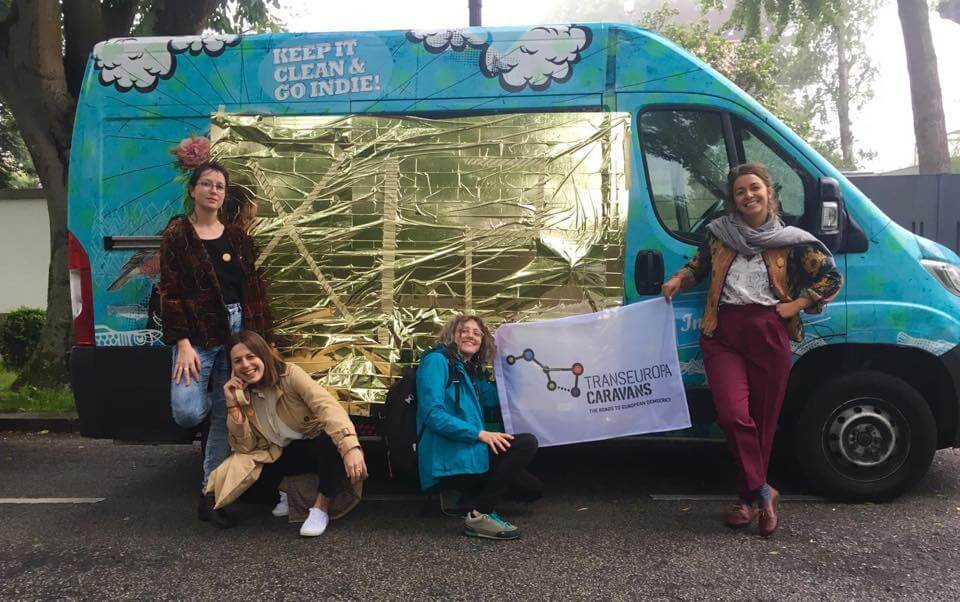
Radical pragmatism meets grassroots actions
As a wave of mass protests swept over Southern Europe against the effects of the eurozone crisis and subsequent austerity in 2010, participants in various countries — many who had never been involved with politics before — decided to try and turn the protests into a more democratic alternative to the status quo.
They set up neighborhood assemblies to discuss further measures and founded grassroots organizations that could prompt changes. A few years later, these informal groupings evolved into multiple candidacies that united urban residents, city movements, and left-wing parties under a policy of “municipalism”: a political strategy that combines local pragmatism with transnational cooperation on issues like civil rights, common goods, migration, and the environment.
Common goods
One of the most important innovations in cities where municipalism has been embraced is the restoration of a belief in “common goods” or the right of public ownership and access. In multiple European cities, re-municipalisation has become a popular issue for urban citizens who feel disaffected and abandoned by national governments. Yet there does not exist a single type of municipalist action; rather there is simply an overarching goal — returning control of important resources to the public — and many flexible paths to achieving it.
Some communities have aimed to establish new public companies that could manage water, while others have focused on both re-municipalisation of energy or municipal management of school canteens. In many cities, cultural workers and residents have occupied city-owned buildings in order to host cultural and educational events, as well as to discuss the use of public goods for civic purposes and to voice strong opposition against the corporate-like management of cities. As a symbolic act, they also occupied bank-owned property that received public funding, while at the same time the banks were conducting mass sidewalk evictions of residents. In Naples, the residents organized grassroots events and debates on the premises of L’Asilo.
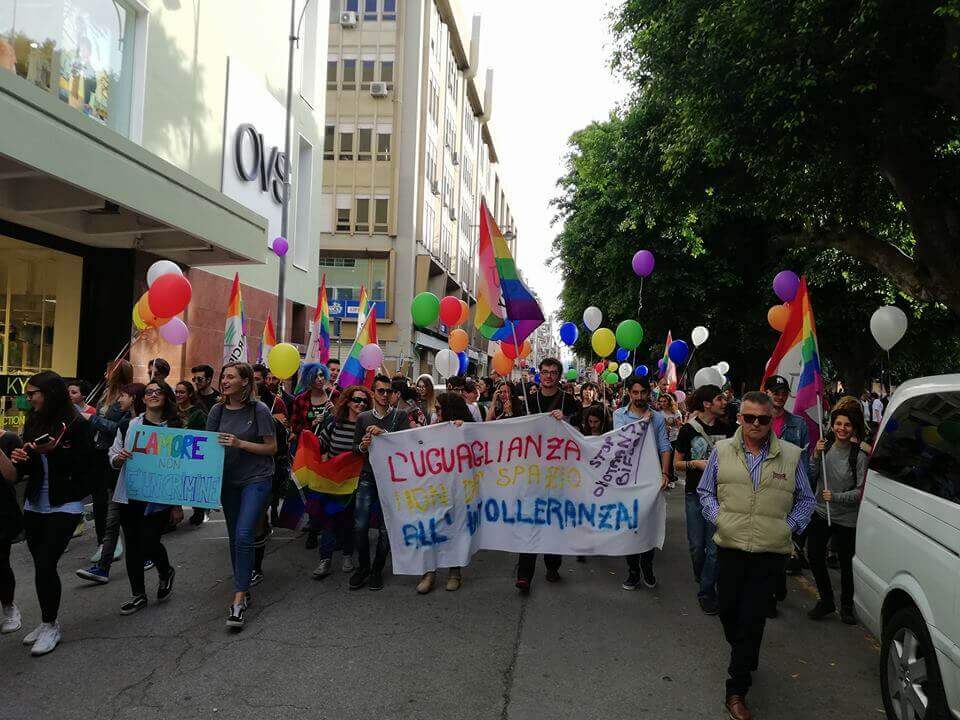
By 2015, several activist groups had been elected to local government positions across Europe. In order to institutionalize the progress municipalist movements had made, municipalists introduced unprecedented legal innovations that would allow for a new form of shared municipal property ownership where residents would be guaranteed free access to public infrastructure.
Likewise, NGOs began to build up policy infrastructure in order to support municipalist actions. Cambiamo Messina dal Basso (Let’s Change Messina from the Bottom) — an Italian municipalist group — created the Laboratory of Common Goods and Participatory Institutions, a civic forum designed to develop projects pertaining to common goods.
Self-government a.k.a. the real democracy
The human dimension cities have also facilitated the development of innovative tools and mechanisms to promote participatory democracy. In Saillans, France, a grassroots platform established by citizens won the 2014 elections, reduced the town mayor’s power and divided all responsibilities equally between the council members. The parish council was substituted by an organizational committee open to the residents with meetings held twice a month, serving as the superior decision-making body.
“We could really feel the direct democracy spirit there. One of the councilmen who studied urban planning told us that during his studies he realized what a technocratic institution the university was,” explains Emilia Esini, a caravan crew member who visited Saillans. “According to what he was being taught, a handful of urban planners and politicians were to make decisions about the space occupied by large numbers of people. What a crazy idea it is to have five people with a ruler decide about what the place that somebody else lives in should look like. And so, it is the residents who make decisions about themselves in this village.”
In bigger cities like Madrid and Barcelona, activists-turned-lawmakers have developed internet tools like Decidim and Decide that allow residents to propose their own solutions for how to upgrade and promote the city. This type of open source software is already being used in 50 cities worldwide and is helping deconstruct the myth of the need for a technocracy.
Municipalist organizations are also trying to restore and strengthen social ties and democratic norms even at the housing complex level. Housing complex residents’ meetings organized by municipalists follow the rules of a people’s assembly and everybody enjoys equal rights to speak. Many meetings have also created ludoteca (toy libraries) where parents and grandparents can leave their little ones with a babysitter. In a society where women still do most of the care work, this system actually gives them a real opportunity to participate in politics.
The right to housing
Since purchasing an apartment has become increasingly problematic for the middle-class due to tourism, unemployment and a lack of affordable housing, municipalists have placed cities at the center of the fight for housing rights.
In Barcelona, activists established Plataforma de Afectados por la Hipoteca (The Platform for People Affected by Mortgages) — a self-organized mutual aid body formed to stop evictions. Its work includes holding assemblies where people can share their situation and receive psychological support, lobbying for changes to relevant laws, and taking direct action to stop evictions.
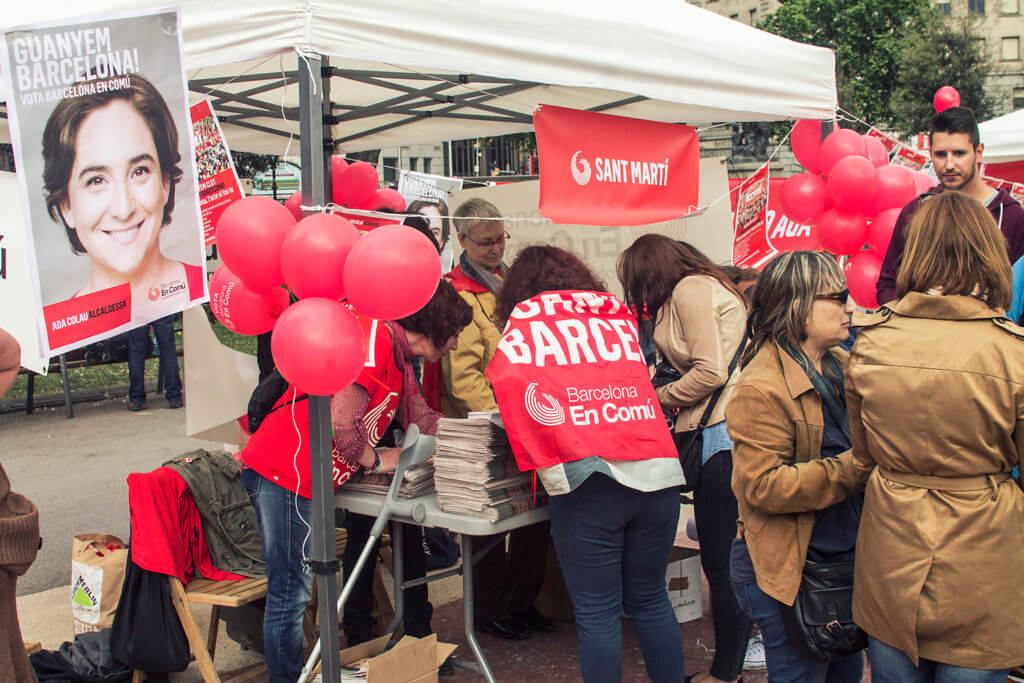
In 2014, some members of PAH and other activists involved in housing rights campaigns formed the municipalist electoral platform Barcelona en Comú and succeeded in taking control of the Barcelona City Council. As the governing minority, Barcelona en Comú has engaged in a number of municipalist projects including temporarily expropriating the unused housing property owned by banks, developing new apartments in a co-op ownership format, banning entire-apartment rentals on Airbnb, and creating a solution for sustainable tourism.
The modern political battlefield is no longer only located in the proverbial factory but rather in the city where the primary identity is being a citizen (rather an employee) and where it is possible to demand rights not directly connected to working conditions. Grassroot associations and tenants’ movements represent the frontline in this new fight.
Solidarity with migrants
By inspiring a sense of fear, politicians have used the rise in immigration to Europe in order to develop their political capital. Rather than capitulate to scare-mongering, cities together with NGOs in Italy, Spain, and Greece have come together in both formal and informal networks to deliver positive change.
An Italian village of a little over 2,000 residents, Riacie has become the symbol of this resistance. In the last decade, Riacie Mayor Domenico Lucano has transformed the village into a place of asylum for almost 500 refugees; offering them abandoned homes and education, reviving the local economy and infusing the village with new life.
In Lesbos, Lampedusa, Paris, and Barcelona, mayors have inaugurated a network of shelter cities which support local government organizations in rescuing migrants and help them integrate. In 2015, Grande-Synthe, France welcomed thousands of refugees, while in Thessaloniki — instead of a refugee camp — the local government established a system for integrating refugees directly into the city.
Ecology, social and solidarity-based economy
Urban capitalism is based on a belief in unlimited economic potential and it promotes a “buy-discard-buy again” model that drives growth. However, it not only forces people to work increasingly long hours — to the detriment of their civic and community life — but it also has a catastrophic impact on the planet.
In order to push back against what they see as an unsustainable development model, municipalists have embraced a circular economy. Apps for trading second-hand goods have become so popular in Southern cities while in Paris 240 entities have become involved in recycling, repairing, and reselling of goods.
In addition to becoming major proponents for reusing resources, cities have also been instrumental in reducing resource consumption. Out of their own initiative, they reduced fossil fuel mining.
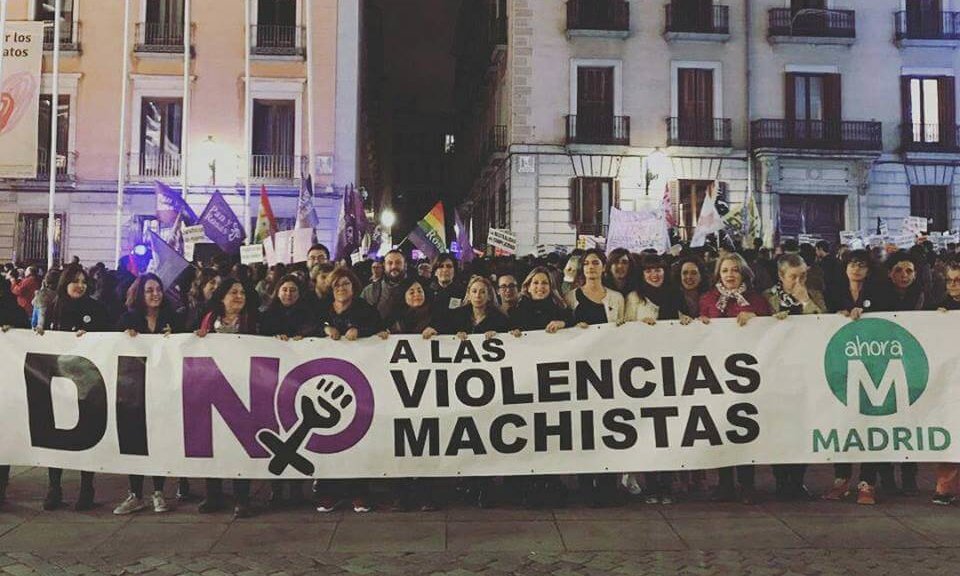
Between 2015 and 2019, Ahora Madrid — another municipalist electoral platform — pushed for cleaner air and city center reclamation by reducing traffic. In Bologna, a network of residents and institutions (AriaPesa) was organized and installed sensors for air pollution in order to fight for the reduction of exhaust fumes more efficiently.
They introduced social clauses in public tenders that prioritize not only the companies with fair employment conditions but also those which meet the requirements for gender equality and environment. Barcelona limited car traffic by introducing so-called supermanzanas (superblocks) creating new public squares instead. Soon after, spontaneously emerging resident groups came up with the idea of putting some playgrounds there.
Cities have also contributed to the debate over guaranteed living standards for their residents. Barcelona introduced a guaranteed minimum income pilot program in the Besòs district and in A Coruña, Marea Atlántica — a grassroots movement which won the city’s 2015 election — introduced the Municipal Guaranteed Minimum Income which aims to give money to people in need without any complicated red tape typical of other social benefits and managed on the municipal level as close to the people as possible.
Europe as a network of cities
Municipalism as a new political paradigm, with all its highs and lows, is still developing. While some groups like those from Barcelona and Naples are planning to expand the horizon of opportunities from government positions, many municipalist groups failed in the last local elections in 2018 and 2019 to renew their terms, so they will now have to make municipalism from the opposition. Social movements need to show how direct democracy can still allow residents to influence politics despite a change in government.
Yet a movement originally built to confront corporate interests and nationalism has in recent years had to face off against the European Union. Due to EU laws, cities had limited options to introduce social clauses or fight negative effects of activities of such corporations as Airbnb.
For Transeuropa Caravana crew members, “there is hope for Europe if one follows the example of what the cities have been developing.” However, “unfortunately politicians fail to see that Europe is nothing but a network of cities.”
The EU does not need the replacement of individual politicians, those anti-EU by pro-EU ones, but rather it requires deep structural change.
**
Translated from Polish by Dorota Blabolil-Obrębska
**
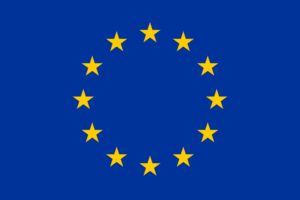
The Transeuropa Caravans project was funded by the European Union’s Rights, Equality and Citizenship Programme (2014-2020). The content of this article represents the views of the author only and is their sole responsibility. The European Commission does not accept any responsibility for use that may be made of the information it contains. Find out more at https://transeuropacaravans.eu.

![Political Critique [DISCONTINUED]](https://politicalcritique.org/wp-content/uploads/2015/09/Political-Critique-LOGO.png)
![Political Critique [DISCONTINUED]](https://politicalcritique.org/wp-content/uploads/2015/09/Political-Critique-LOGO-2.png)